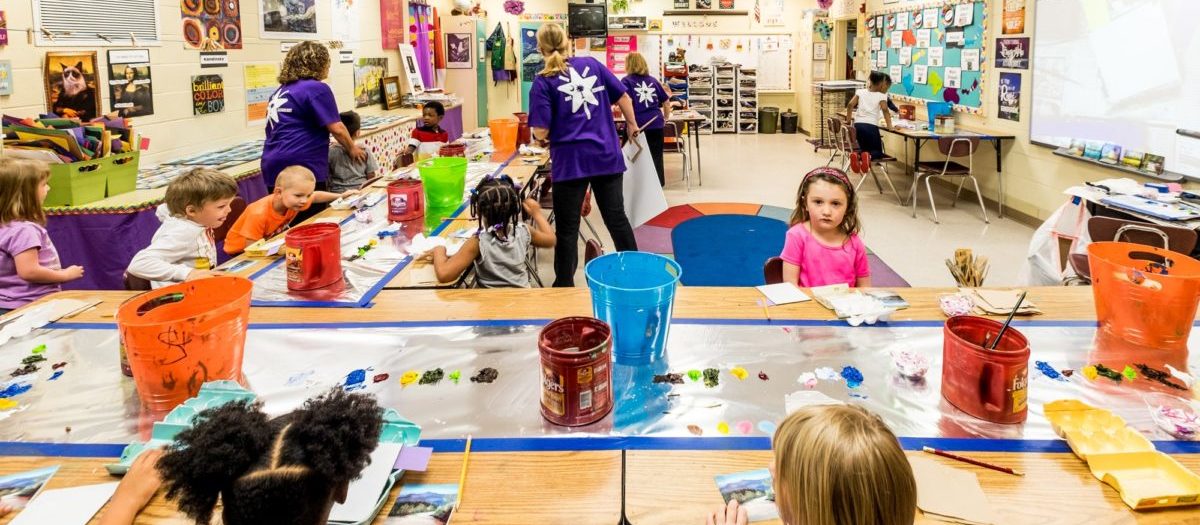$20 million partnership to expand S.C. arts learning initiatives
SCAC, S.C. Dept. of Education make landmark announcement

An Arts in Basic Curriculum Project site classroom. SCAC file photo.
For Immediate Release
A $20 million partnership announced today by the South Carolina Department of Education and South Carolina Arts Commission will help public schools throughout the state address pandemic related learning loss with proven, arts-based learning initiatives.
The American Rescue Plan, passed by the U.S. Congress and signed into law March 11, 2021 by President Biden, included $121.9 billion in Elementary and Secondary School Emergency Relief funds (ARP ESSER), that has been administered through the U.S. Department of Education to state educational agencies.
The South Carolina Department of Education (SCDE) is set to receive $2.1 billion in ARP ESSER funds to help South Carolina’s public schools address the impact that COVID-19 has and continues to have on students, families, educators, and school communities. Ninety percent of these funds will flow through to school districts with amounts determined in proportion to the amount of Title I, Part A funds they received in Summer 2020 from funds under the Every Student Succeeds Act. The remaining funds, which amount to $211,205,148 are to be used for state-level activities to address learning loss, summer enrichment programs, and comprehensive after school programs.
The SCDE solicited public input on the use of these funds and the needs that the state should address in its ARP ESSER plan which was submitted to the U.S. Department of Education on June 18, 2021. Leadership from the South Carolina Arts Commission (SCAC) proposed to SCDE a creative pathway—rooted in innovation and evidence-based practices—that the arts are equipped to provide. Funding was requested to allow the SCAC’s team of professionals and network of partners to:
- help schools and teachers fill learning loss gaps in the arts,
- use arts integration to remediate core subject areas,
- and provide summer and afterschool learning opportunities that leverage the arts in schools throughout the state.
The SCDE approved $20 million for the SCAC to implement its plan over the course of the next three years.
“As a longtime music teacher, I have seen firsthand the impact that arts education can have on students,” said State Superintendent of Education Molly Spearman. “The arts have a unique ability to engage students of diverse backgrounds across all subject areas which makes this initiative well suited for the receipt of these funds.”
“The South Carolina Arts Commission is confident in its ability to put this funding to use right away to equitably impact learning using the arts,” SCAC Executive Director David Platts said. “Our team of professionals manages existing programs, partnerships, and grant-making infrastructure for this work, which includes federal and state reporting for accountability. ARP ESSER funding from the SCDE will enable expedient and effective scaling with various arts education partners on the local, state, and national levels.”
Programmatic focus areas of the SCAC’s plan include:
- Arts integration
- Arts in early childhood
- Arts industry certification credentials for high school students, building on existing vocational training programs
To realize its classroom-based goals, the SCAC will rely on its partners at the Arts in Basic Curriculum (ABC) Project, which currently serves about 44,000 students in 74 schools and has been cooperatively led for more than 30 years by the SCAC, SCDE, and Winthrop University. The ARP ESSER funding will facilitate scaling the program to:
- increase access to quality arts education (targeting underserved communities)
- develop arts-rich learning environments
- build, restore, expand, and support infrastructure for arts learning at the district level
- research and develop new and innovative instructional practices.
“We have a couple of years’ worth of recent Gallup Organization research looking at South Carolina’s arts-rich schools. It repeatedly shows a link between arts-rich learning and student hope and engagement. We have dreamed about having the kind of funding that would enable expansion to all communities throughout the state,” SCAC Board Chairwoman Dee Crawford said.
In addition to building on the work of the ABC Project, the Arts Commission will expand existing pilot projects with the South Carolina Governor’s School for Arts & Humanities in Greenville and Engaging Creative Minds in Charleston, and will offer grant and programming opportunities for arts education providers across the state.
“Arts and creativity are critical to achieving the knowledge, skills, and characteristics outlined by the Profile of the South Carolina Graduate. We are excited to work with grantees, statewide partners in arts education, and other arts providers to ensure equitable access to learning in and through the arts,” Platts said. “This partnership fully supports our mission to promote equitable access to the arts and support the cultivation of creativity in South Carolina.”
The SCAC is working now to release information on grant guidelines, research to support evidence-based practices, partnership and professional learning opportunities, and more in coming weeks. Starting in July, these resources will be available at www.abcprojectsc.com.


